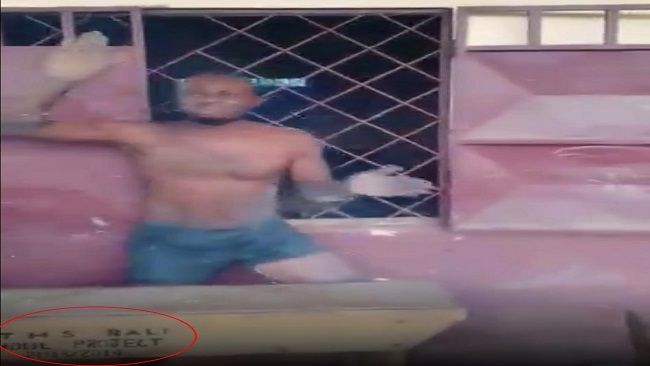Scandal: Video Shows Ambazonia Forces Torturing Man
A video viewed by Human Rights Watch shows armed separatists torturing a man in an abandoned school in the North-West region of Cameroon in mid-May, 2019.
The video, verified by a dozen sources including five people who recognize the school and its location, corroborates previous accounts of torture and occupation of schools by armed separatists documented by Human Rights Watch.
“Once again material is circulating to support allegations that armed separatists are abusing civilians,” said Lewis Mudge, Central Africa Director at Human Rights Watch. “Separatist leaders should immediately direct their fighters and followers to halt attacks, including torture and other abuse aimed at civilians.”
The footage shows at least four separatist fighters threatening and torturing the man, who is wearing only his underwear, forcing him to sit on burning pieces of paper and beating him with sticks and machetes.
An analysis of the dialogue in the video reveals that the victim is a driver from the village of Bali who had been transporting products for Brasseries du Cameroon, a state-owned company the separatists oppose. They have banned the marketing, purchase, and transport of its drink products within the areas they control.
Separatists can be heard accusing the driver of selling Brasseries’ products in the Bali and Batibo parts of the North-West region. The victim, who has yet to be identified, begs his torturers to stop, but they instead threaten to “wash him with gasoline,” implying they will kill him.
The attackers and the victim speak Mungaka, a language common among communities in Bali. The video appears to have been filmed at the Government Technical High School in Bali, as the writing on a school desk shows at the 05:41 mark in the video. Five people from Bali who know the school well told Human Rights Watch that this is the school in the video.
They also said separatists hold and abuse hostages there. The school, which had a capacity of over 800 students, has been closed since mid-2017 due to violence and the separatists’ boycott of education to make the area ungovernable and to signal that the situation in the Anglophone regions is untenable.
The separatists are most likely from a group that controls Bali, whose leader was known as General Koraman. In March, a video surfaced of Koraman declaring that he and his men would intercept vehicles from the Brasseries du Cameroon. Sources suggest that the video was filmed in the first half of May. Reliable reports indicate that Koraman was killed on June 1.
Since late 2016, the Anglophone regions of Cameroon have been gripped by deadly violence, claiming the lives of over 1,800 people and forcing half a million to flee their homes. Government forces have killed scores of civilians, torched hundreds of homes, and used torture and incommunicado detention against people suspected of belonging to separatist groups, with near-total impunity. Armed separatists have killed hundreds of members of security forces and assaulted and kidnapped hundreds of people during their increasing attacks and growing calls for secession of the North-West and South-West regions.
Since the crisis escalated, armed separatists have used schools as bases, deploying fighters and weapons and holding people hostage in and near them. Separatists have disrupted normal life in the areas they control by enforcing strikes, consistently targeting school buildings, and threatening education officials and students with violence if they did not comply with separatist demands to boycott schools.
In one case, armed separatists kidnapped two children, ages 16 and 17, from their home in Nkwen, Bamenda, North-West region in the morning of June 8. Their father told Human Rights Watch that the separatists accused the children of studying for the General Certificate Examination: “They arrived with motorbikes, they entered the house with guns and threatened everyone. They said my kids were defying the ban on education. Then, they took them away. They called asking for a ransom. I don’t know how I will find the money. I am scared my girl might be raped.” The children were beaten and released three days later, following a ransom payment.
Armed separatists have also tortured dozens of people. In the past year, Human Rights Watch has documented numerous cases of torture by armed separatists against workers of the Cameroon Development Corporation, who work in the company’s banana plantations near Tiko, South-West region. The workers have been beaten or maimed because they refused to participate in a general strike called by the separatists.
On June 18, separatists kidnapped at least 40 people, including women and children, travelling in a four-vehicle convoy in Bafut, North-West region. Human Rights Watch spoke with two people who escaped. A 37-year-old man from Wum said that about 20 armed separatists ambushed the vehicles: “They came out of the woods, fired in the air, and stopped the cars. They were shouting ‘Amba! Amba!’ (short for “Amba Boys,” how many of the separatists are known and how they refer to themselves) and were threatening to shoot the women.” The separatists beat and robbed the people, then released them on June 19.
Cameroon’s international partners and the UN Security Council should impose targeted sanctions on separatist leaders who bear responsibility for abuses, including torture and occupation of schools, Human Rights Watch said.
The video of the torture in Bali emerged four weeks before a United Nations Regional Office for Central Africa briefed the UN Security Council on June 4. Nine human rights organizations urged the Security Council to focus on the humanitarian and human rights situation in the Anglophone regions.
“The separatists should know the world is paying attention and those responsible for torture will face the consequences,” Mudge said. “Armed separatists should let children return to their studies and stop using the schools to carry out their campaign.”
Source: Human Rights Watch





